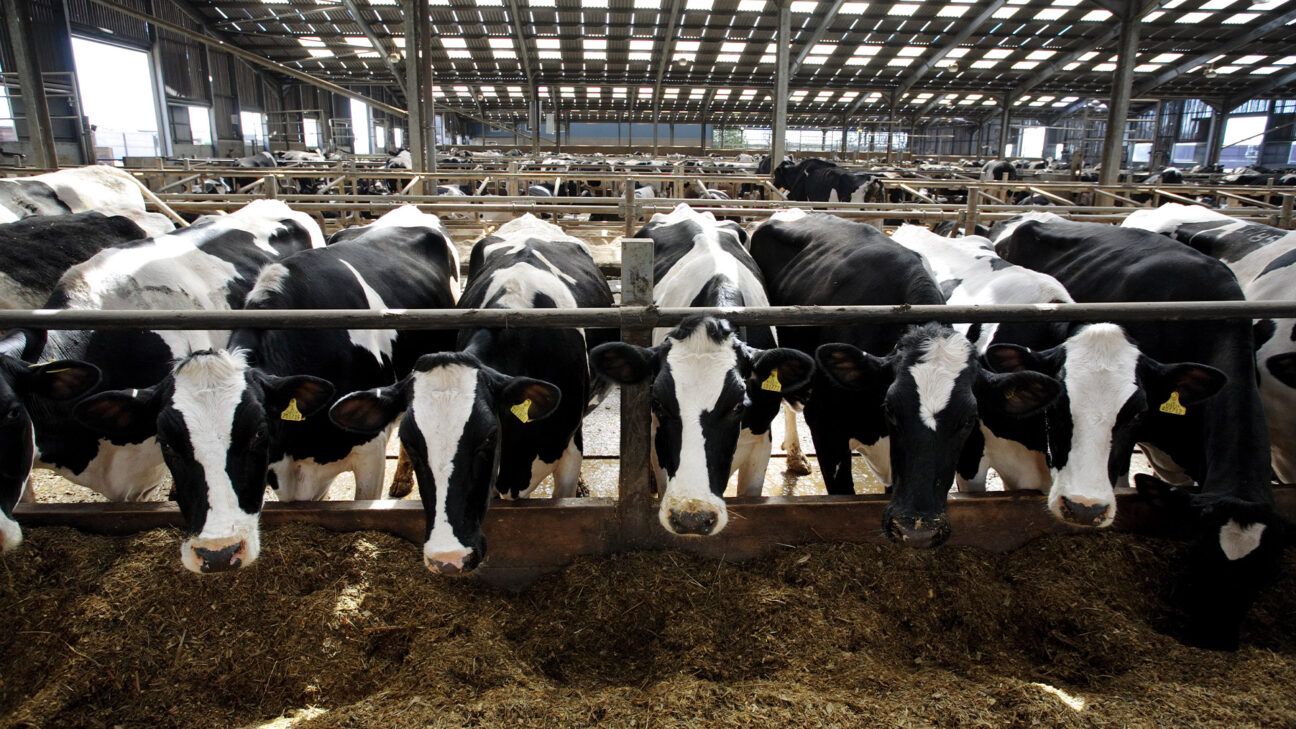New Type Of Bird Flu Detected In Us Dairy Cows. Is It Safe To Consume Milk, Beef?

The transmission of a new strain of the H5N1 bird flu to herds of dairy cows has raised concerns over how the virus is mutating. Andrew Fox/Getty Images
- A new strain of bird flu has been discovered in the milk of some dairy cow herds in the U.S.
- Experts say the nation’s food supply remains safe due to the rigorous inspection procedures for cattle herds and the pasteurization of most milk products.
- However, some experts remain concerned about the potential spread of bird flu to humans.
A second variant of the H5N1 bird flu has been found in dairy cows in the United States.
The United States Department of Agriculture (USDA) reports that the new version of bird flu, known as D1.1, was discovered in the milk of cows in two counties in Nevada. This is the first time this strain has been identified in cattle.
The B3.13 strain of bird flu has been linked to infections in 950 herds of cattle in 16 states. This version is the one that’s been primarily found in chickens and other birds and led to a nationwide shortage of eggs.
The discovery of the D1.1. variant in cattle has raised concerns about how quickly the bird flu virus may be mutating.
“It’s modifying itself so it’s not just staying in the poultry and the wild waterfowl. It’s picking up a home in the mammals,” Beth Thompson, DVM, South Dakota’s state veterinarian, told Reuters.
Government officials say the risk of bird flu transmission to humans remains low, although some experts aren’t entirely convinced.
Concerns have also been raised about bird flu potentially contaminating the nation’s meat, milk, and egg supplies.
Government health officials say food products remain safe for consumption when properly stored and cooked.
Here’s a look at the spread of the bird flu virus and its potential dangers to the nation’s food supply.
Risk of bird flu in humans remains low
The Centers for Disease Control and Prevention (CDC) have confirmed cases of bird flu in 67 people in the U.S. during the current outbreak. Most of those people worked closely with dairy cows and poultry.
CDC officials say most of the people who’ve become sick from bird flu have had mild cases.
However, bird flu has the potential to cause serious illness. The World Health Organization reports that of the 950 human bird flu cases reported worldwide in the past two years, about half have resulted in death.
One of them was a Louisiana man who died from the D1.1 variant early this year. He is the only person in the U.S. so far to die from the current bird flu outbreak.
In November, a Canadian teen was hospitalized in critical condition after contracting bird flu. She has since recovered.
CDC officials report that the “current public health risk is low for H5 bird flu,” although the agency says it is still monitoring the situation.
They note that farmers, backyard bird flock owners, and people such as veterinarians who work closely with animals and their byproducts are at the highest risk.
William Schaffner, MD, an infectious disease expert and a professor of medicine at Vanderbilt University in Tennessee, agreed with the CDC’s assessment.
“The bird flu virus has not developed the genetic capacity to easily infect humans or to be transmitted easily from person-to-person,” he told Healthline.
Schaffner highlighted that, to date, there have been no documented cases of person-to-person transmission in the U.S.
Not all experts are as certain, though. One notes there has been a high transmission rate from birds to cattle as well as from birds to people.
“I would say the risk of spillover of this genotype is also high from cows to humans. We know it has already spilled over from birds to humans,” Abraar Karan, MD, a post-doctorate researcher of infectious diseases at Stanford University in California, told Healthline.
Karan’s opinion is supported by Seema Lakdawala, PhD, an influenza virologist at Emory University School of Medicine in Atlanta, Georgia. “The risk has increased as we’ve gone on — especially in the last couple of months with the report of [some] severe infections,” she told the journal Nature.
Are milk, beef safe to consume during the bird flu outbreak?
Bird flu has been detected in some raw milk products, leading to a voluntary recall in California last November.
However, bird flu has not been found in pasteurized commercial milk products. Experts say that’s because the pasteurization process kills the virus.
“Pasteurization has been shown to work well to inactivate the virus,” said Karan.
“Pasteurization kills the bird flu virus, so all pasteurized dairy products (milk, cream, yogurt, cheese, etc.) are safe,” added Schaffner. “There is a risk to consuming unpasteurized milk and dairy products, so it is recommended they be avoided.”
There have also been concerns raised about the safety of beef products, but USDA officials say the nation’s “rigorous meat inspection process” keeps the meat supply safe.
In addition, CDC officials note that cooking poultry and beef to proper internal temperatures also kills the virus.
Experts agree.
“We haven’t seen transmission from beef directly, but I would not eat raw beef for now, although transmission from consumption hasn’t been shown yet,” Karan said.
“No risk has been associated with eating beef, but the usual recommendations continue: wash hands thoroughly, wash cutting boards after use, cook hamburgers well done,” added Schaffner.
Are eggs safe from bird flu?
Since January 2022, there have been more than 1,500 reported outbreaks of bird flu among poultry and wild birds in 634 counties in the United States.
The outbreaks have resulted in slaughtering more than 145 million chickens, turkeys, and other birds to contain the virus.
The killings have created a nationwide egg shortage, driving up prices. Nonetheless, experts say eggs are safe to eat if stored and cooked properly.
The CDC advises cooking eggs to an internal temperature of 165 degrees to kill the bird flu virus. They should be cooked “all the way” before eating.
Takeaway
The transmission of a new strain of the H5N1 bird flu to dairy cow herds has raised concerns over how the virus is mutating.
Government officials say the risk of bird flu being transmitted to humans remains low, although some experts say the situation should be closely monitored.
Government officials and experts agree that the nation’s milk supply remains safe because pasteurization kills the bird flu virus.
They add that the nation’s beef supply is also safe because of government inspection programs, although they still recommend cooking meat thoroughly.


